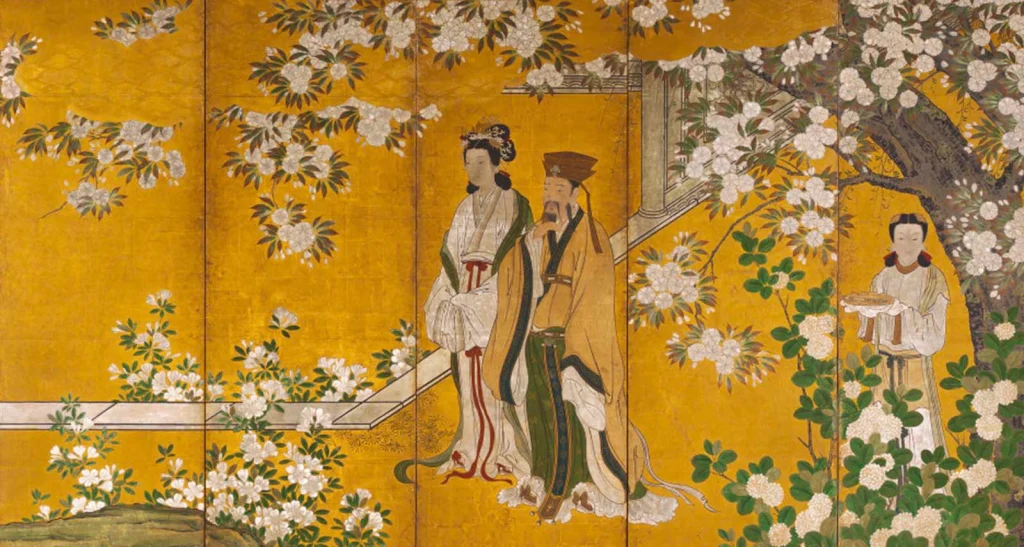In an ancient summer palace now deserted
Save a few palace flowers, very lonely and quite red
Attended by a white-haired lady
Who sits and talks of Xuanzong
Bygone Days
Let us speak of bygone days in ancient summer palaces, of the brilliant emperor Xuanzong and his lovely lady Yang Guifei.
The rebellion of General An Lushan did not end until 763, but by then the damage had been done. The Chinese Emperor Xuanzong fled the capital of Chang’an with the Lady Yang Guifei for Sichuan. The army revolted, and blaming Yang Guifei and her family for the troubles with An Lushan, refused to proceed further unless Xuanzong rid himself of the lovely Yang. Thus, she was strangled and left by the side of the road. The emperor proceeded on. then abdicated in favor of his son, who eventually defeated the rebel forces.

Bygone Days
Let us speak of bygone days in ancient summer palaces, of the brilliant emperor Xuanzong and his lovely lady Yang Guifei.
The rebellion of General An Lushan did not end until 763, but by then the damage had been done. The Chinese Emperor Xuanzong fled the capital of Chang’an with the Lady Yang Guifei for Sichuan. The army revolted, and blaming Yang Guifei and her family for the troubles with An Lushan, refused to proceed further unless Xuanzong rid himself of the lovely Yang. Thus, she was strangled and left by the side of the road. The emperor proceeded on. then abdicated in favor of his son, who eventually defeated the rebel forces.
The poet Yuan Zhen ( 元稹, AD 779 – 831) was not born until almost twenty years after the end if the An Lushan Rebellion. The Tang Dynasty was then still reeling from the war’s devastation. China experienced a succession of emperors who unsuccessfully tried to deal with regionalism and factionalism, famines and floods.

Yang Guifei
The lesson of the Lady Yang Guifei was still a powerful one in Chinese literature. She was hailed in literature as one of the Four Great Beauties (四大美女 sì dà měinǚ). It was said of her that a flower’s beauty paled in comparison to hers. It was also said that the red peony was her favorite flower.
Pinyin and Chinese
Liáoluò gǔ xínggōng
gōng huā jìmò hóng.
Báitóu gōngnǚ zài
xián zuò shuō xuánzōng
寥落古行宫
宫花寂寞红
白头宫女在
闲坐说玄宗
Notes on Translation
Yuan Zhen’s rhyme is lost in translation. Take, as one example, xínggōng, the summer palace of line one, last word, and Xuánzōng, last line, last word.
行宮, xínggōng, literally, an auxiliary palace, like Huaqing Palace with its Imperial Hot Springs Bath, where the Emperor Xuanzong and Yang Guifei would go in the summer months.
宮, gōng, palace; 花, Huā, flower. Referring to the few flowers that still grow about the palace, but also indirectly to the memory of Yang Guifei. 寂寞, jìmò, lonesome, lonely. 红, hóng, Red, the color worn by Chinese brides. Red also represents the summer season. Compare the homophone, 哄, hǒng, to deceive, or to coax. Yuan Zhen was, most likely, referring to Huaqing Palace (華清宮) and accompanying Furong Gardens (芙蓉园).
白頭, báitóu, white haired; 宮女, gōngnǚ, female attendant.











